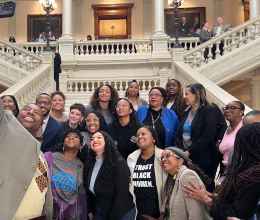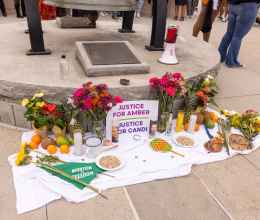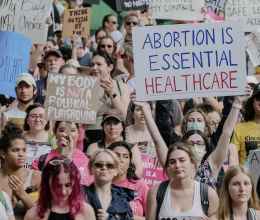FOR IMMEDIATE RELEASE: June 24, 2022
Media Contact: Dorrie Toney, [email protected]
Abortion is Still Safe and Legal in Georgia
ATLANTA — The Supreme Court issued a ruling today in Jackson Women’s Health Org. v. Dobbs (“JWHO”) that overturns Roe v. Wade, the landmark decision recognizing a federal constitutional right to abortion. This decision turns back the clock nearly 50 years on women’s rights across the nation and is an unprecedented attack on reproductive freedom.
While abortion is still legal today in Georgia, in 2019, anti-abortion politicians in Georgia passed a law banning abortion at 6 weeks of pregnancy—before most people even know they are pregnant. The law, HB 481, is currently blocked by a federal court injunction in Sistersong v. Kemp, a lawsuit filed in 2019 by the American Civil Liberties Union, the ACLU of Georgia, the Center for Reproductive Rights, and Planned Parenthood. In July 2020, the U.S. District Court for the Northern District of Georgia ruled that Georgia’s abortion ban violated the U.S. Constitution and permanently blocked HB 481 from going into effect. The State’s appeal of that ruling is currently before the 11th Circuit, which had stayed its proceedings on the appeal pending the Supreme Court’s ruling in JWHO. With the Supreme Court’s decision today, the 11th Circuit Court of Appeals will likely soon take action to ultimately put Georgia’s 6-week abortion ban into effect.
“The ACLU of Georgia is committed to using every tool at our disposal to keep abortion safe and legal in Georgia,” said Andrea Young, Executive Director of the ACLU of Georgia. “Women must be able to make these personal, private, decisions for themselves with their own families, their own faith and their own physicians without interference from politicians.”
Forcing women and all people with the ability to get pregnant to continue pregnancies against their will, will expose them to the serious health risks associated with pregnancy, including heart attacks, stroke, and kidney damage. In Georgia, these pregnancy-related conditions are experienced disproportionately by Black women, whose risk of maternal death is one of the highest rates in the nation. Black women are also most often impacted by a critical shortage of medical providers in the state, which will likely become worse if abortions are illegal—as doctors and other health care providers may leave the state rather than risk criminal charges for providing essential reproductive health care. The abortion ban will also mean that any miscarriage after approximately 6 weeks of pregnancy is a potential cause for criminal investigation—a particular threat to Black and Brown communities, who are most often targeted when pregnancy outcomes are criminalized.
“We are not rolling over and allowing a court steeped in white supremacy to strip away our freedom. Our opposition have made their plan clear and have been working for decades to get us to this moment. This is not just about abortion. These attacks are about their desire to stay in power. But this moment has given us the opportunity to build our collective power. Folks are realizing that all of our social justice movements - voting rights, environmental justice, economic justice, racial justice, Queer & Trans liberation, disability justice - are inextricably linked to Reproductive Justice. Now is the time that we all fight together for our human right to control our own bodies and determine our futures,” said Monica Simpson, the executive director of the SisterSong Women of Color Reproductive Justice Collective.
The ACLU of Georgia is united with SisterSong and others fighting for reproductive freedom in the state and will not relent in its judicial pursuit to protect and expand the rights for all Georgians to make their own decisions about their bodies, their families, and their futures.
ACLU of Georgia resources on Reproductive Freedom:
American Physicians Speak Out:https://acluga.org/reproductive-rights-videos/
Georgia’s Maternal Mortality Crisis:https://acluga.org/reproductive-rights-the-problem/
Background: FAQ on Abortion Ban Lawsuit and HB 481https://acluga.org/reproductive-rights-faqs/
Abortion is Essential: Stories of Liberationhttps://www.aclu.org/news/reproductive-freedom/abortion-is-essential-stories-of-liberation


